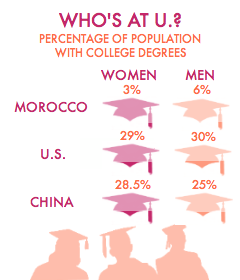
September 7, 2012 | Economic Opportunity
Woman of the Week: Henriette Kolb
Under the leadership of Henriette Kolb, the Cherie Blair Foundation for Women in partnership with Nokia announce the launch of Businesswomen, a text messaging service catered to women entrepreneurs in Nigeria

By Ashley Bush
As CEO of the Cherie Blair Foundation for Women, Henriette Kolb spends a significant amount of time traveling to far-flung places from the Middle East to Africa to Asia—all in the name of advancing women entrepreneurs.
Prior to joining the Foundation, Kolb worked in Jerusalem for the Office on the UN Special Coordinator for the Middle East Peace Process and as an advisor for Quartet Representative Tony Blair. And before that, she was the programme manager with the European Commission in the Delegation to Tanzania on health, HIV/AIDS and governance.
It comes as no surprise that Kolb was recently recognized on DevEx’s “40 under 40” London list, a list that acknowledges the work of respected leaders in international development.
Under Kolb’s leadership, the Cherie Blair Foundation for Women has expanded to advance the work of women entrepreneurs in more than 25 countries across Africa, Asia, and the Middle East. Founded in 2008, the Foundation provides businesswomen in emerging and developing markets essential tools and resources to overcome barriers they may encounter.
Most recently, on August 23rd, the Foundation launched a powerful partnership with Nokia to bring a service called Business Women to Nigeria. Through this service, women entrepreneurs receive essential business and entrepreneurial tips via frequent SMS text messages to mobile phones with the Nokia Life service. By providing bite-size, valuable information on business management, women entrepreneurs in Nigeria can now learn the essentials from 4 to 5 text messages per week.
1) Can you describe how you got to where you are today?
I witnessed the German reunification process as a teenager and I worked in Northern Ireland during the signing of the Good Friday agreement. These two truly historical events gave me hope and confidence that we can make progress even in seemingly hopeless situations, that if we want to achieve positive change, it is possible. I have always been fascinated by combining policy design, political understanding and practical support to enable people - particularly those who are less fortunate - to make better choices, no matter where they are in the world.
This conviction led me to become first a history and literature teacher for teenagers from less privileged backgrounds, to later on working in Tanzania, Israel, Palestine and the UK with bilateral aid agencies, the European Commission, the UN and Middle East Quartet Office, and to the Cherie Blair Foundation for Women.
2) What are the most important lessons you have taken from your past experiences that brought you to your current role as CEO of The Cherie Blair Foundation for Women?
I have learned that no matter what institution you work in, you discover dedicated, inspiring, talented and humble people who can help you advance towards common goals. Sometimes that means building unusual alliances across sectors, and putting aside preconceived ideas in order to understand what each party can bring to the table. Such alliances can be incredibly powerful as their reach taps into a wider community which can then be engaged in our work. The second important lesson is never to give up asking questions and to continuously learn from others. Always be open to different subjects and areas you don’t know. The key to success is to acknowledge that we cannot work alone, and that we depend on others continuously to help us adapt, experiment and grow in what we do.
3) Why focus on women entrepreneurship?
Having seen many times over the incredible entrepreneurial talent of women in all the countries where I have worked, and knowing full well that these women could contribute so much more to their own communities and economies if barriers were lifted, made me passionate about what we do at the Foundation.
Women who have an independent income tend to have greater control over their own and their children’s lives. Economic power gives women security and a more influential voice in tackling injustice and discrimination. Yet women entrepreneurs around the world still lack the business skills, technology, networks and access to finance they need to be successful in the long term. Working in partnership with local organisations, the Foundation develops programmes that build confidence, capability and capital in women.
4) Is there a specific reason Business Women is launching in Nigeria? Any other locations you plan to expand the program to?
There's no specific reason why we chose Nigeria first. Later this year, as well as Nigeria, we plan to provide the Business Women mobile application tailored to other countries such as Egypt and Indonesia, and hopefully even more countries in the future. Before the initial launch, the Foundation undertook a six month research study in Nigeria, Indonesia and Egypt to better understand how mobile technology could help women entrepreneurs manage and grow their business. We selected countries with different mobile markets where women entrepreneurs could clearly make a bigger contribution to the economy if given the necessary support. The full study can be found here: www.cherieblairfoundation.org/mobile
5) Can you give an example of how the partnership with Nokia and the formation of Business Women will better service participants? And why text messaging?
The empowerment of women in business lies at the heart of the new mobile phone service. It offers women entrepreneurs’ essential tips and practical advice on starting and running a successful business using a mobile phone. Women can receive several text messages per week about, for example, the need to insure staff, how to register a business and how to better understand your customers. Both the text messages, as well as the mode of delivery by SMS, are gender neutral - you don’t need special language for women - but the content has been developed to help overcome the specific challenges that women entrepreneurs face. We made the decision to use text messages because most entrepreneurs have only access to a simple phone and use SMS most commonly, and we wanted to develop a solution which could be used by the majority of people. However the Business Women application will look different in Indonesia where more women have access to more sophisticated phones.
6) What advice would you give the next generation of women interested in your field of development work?
Work in different sectors, which can help you understand incentives and barriers to development. Take up the not so perfect job and make it into one. Go out and be bold, and work in a different country. This will enable you to engage in work with people from different cultural backgrounds to your own. It will help you too in asking questions, being non-judgemental and developing flexibility.